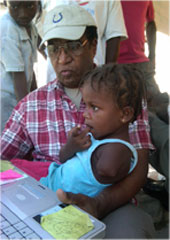

Two year old quake survivor Sarafina with Pierre Leroy, HPSP founder, January 2011. HPSP is helping Sarafina get a prosthetic device.
|
HAITI – THE WORLD’S FIRST BLACK REPUBLIC
Haitians remain fiercely proud that their country was born of the only successful slave revolt in the history of the world. A small group of slaves defeated the army of the most powerful dictator in the world, Napoleon Bonaparte, and simultaneously Spanish and British troops. And thus on January 1, 1804, Haiti became the first Black republic in the world and the second independent country in the New World. The Haitian slaves were inspired by the same ideals as the American and French Revolutions – liberty, equality, fraternity! – for all races.
On December 6, 1492, Christopher Columbus and his men landed on the island of what is known today as Haiti and the Dominican Republic. They were met by the Arawak Indians. Columbus described the Arawaks as “loveable, peaceful, tractable and praiseworthy.” The Arawaks called their homeland Kiskeya, Land of Beautiful Mountains. In the years that followed these gentle people were enslaved in mines and exposed to the ravages of European transmitted diseases. The Arawak population all but disappeared. The Spanish crown then granted approval to import Black slaves from Africa.
In 1697, the Treaty of Ryswick was signed between Spain and France. The western part of Hispanola (the Spanish name for the island) was ceded to the French. The eastern part remained with Spain. The French portion of the island became known as Saint Domingue. St. Domingue became France’s most prosperous colony, known as the Pearl of the Antilles. The African slaves were often worked to death and then easily replaced by the arrival of more enslaved Africans. Soon the Black slave population of St. Domingue had reached 500,000.
As history has so often shown where there is oppression there is resistance. Under the leadership of Toussaint L’Overture the slaves revolted. Toussaint became the most powerful man on the island. He was promoted to the rank of general in the French army and in 1801 became governor. At a “peace” conference Toussaint was tricked by the French and taken prisoner. He was exiled to France and died in prison in 1803. But before leaving he predicted that the revolution would continue and be successful.
His comrades Jean Jacques Dessalines, Henri Christophe and Alexandre Petion rallied their forces and valiantly struggled on. Napoleon sent 70 warships and 25,000 troops to suppress the revolt. These forces were resoundingly defeated. The world’s first Black republic was born from a successful slave rebellion. The embers of freedom that had been fanned would not die. The world’s most famous army was defeated by a band of slaves. Dessalines, Petion, and Christophe would not make the same mistake as Toussaint. They vowed to fight on to the end, liberty or death. On November 18, 1803 France’s General Rochambeau signed an armistice providing for the complete removal of French troops from Haitian soil and paving the way for the Louisiana Purchase. Haiti’s independence was proclaimed in Gonaives on January 1, 1804.
The superpowers of the day were not happy by this development. The United States, which still had slavery, refused to recognize Haiti. Haiti was isolated and its independence was often threatened. France forced Haiti to continue to pay a huge debt. Haiti’s freedom remained threatened. But Haiti was an inspiration for the liberation movements in Latin America. In fact material aide and training was given to Simon Bolivar (the Great Liberator) and his forces.

|

